

Informative Essay
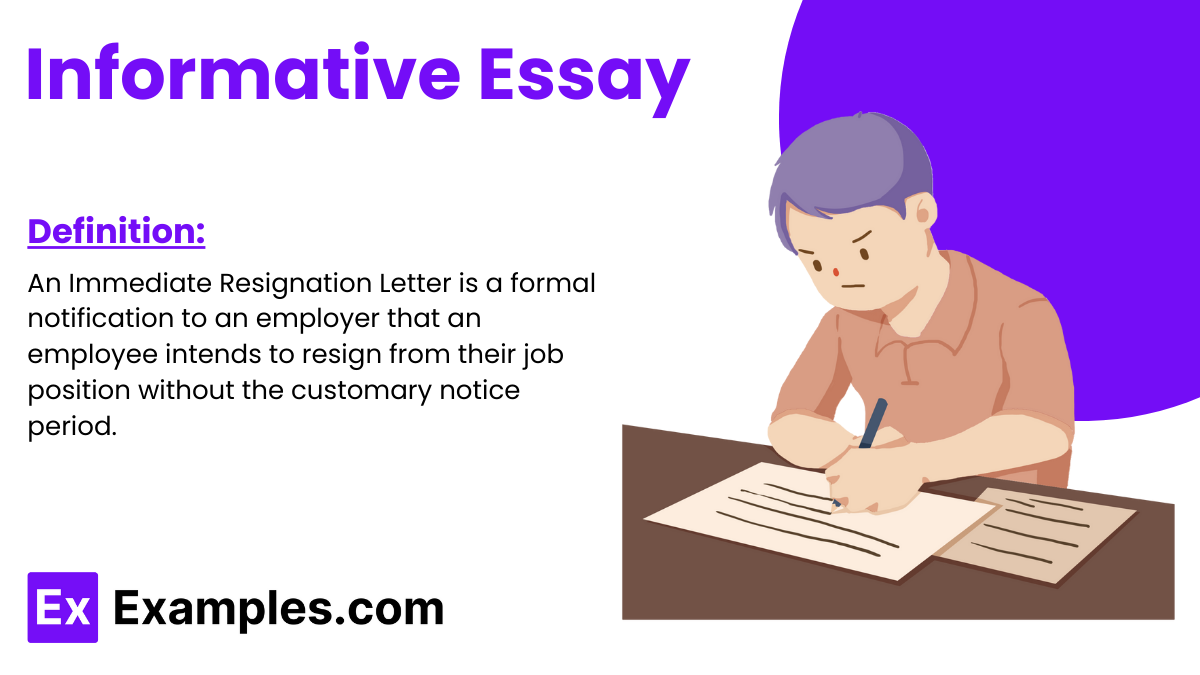
An Informative Essay stands out in the academic world as a tool for students to elaborate on specific topics with depth and clarity. By incorporating factual details and supporting evidence, these essays educate and enlighten the reader. This guide, enriched with practical essay examples , is tailored to assist students in mastering the art of crafting compelling and informative essays. Whether for school assignments or personal exploration, these examples provide valuable insights into effective informative essay writing.
What is an Informative Essay?
An informative essay is a genre of writing aimed at educating the audience on a particular topic or subject. This type of essay doesn’t just offer facts but also provides insights and explanations to help readers understand the subject matter more deeply. Unlike persuasive essays, which aim to convince readers of a particular viewpoint, informative essays are neutral; they do not express the writer’s personal opinions or arguments.
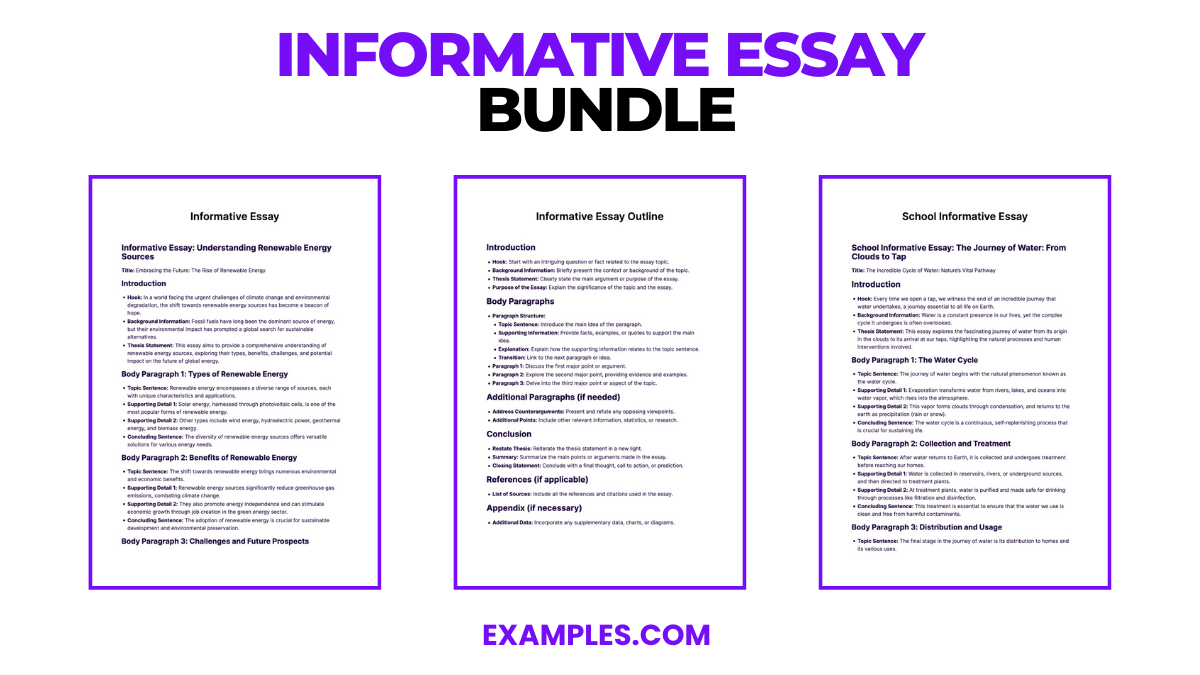
Download Informative Essay Bundle
You may have already been flooded with all these load of essays that your teacher asked you to write. You are probably thinking of a clever way on how to get away from the situation where you probably have not ever dreamed of. However, it is a task that we should all be thankful for. Essay writing actually brings more benefits than browsing through those social media platforms that you have already memorized. It does not only sharpen your minds and makes you more creative than putting likes and hitting shares of your friends’ post. The ability to share something from your mind is definitely a plausible act.
Informative Essay Format
Crafting an informative essay requires a structured approach to organize the wealth of information in a way that’s easily understandable to the reader. The format of an informative essay typically consists of three main parts: the introduction, the body, and the conclusion. Following this format helps in developing a coherent and logically flowing essay that effectively informs the reader.
Introduction
The introduction sets the stage for the entire essay. It should start with a hook that grabs the reader’s attention, such as a surprising fact, a question, or a vivid description of the topic. Following the hook, provide some background information to help readers understand the context of the essay. Finally, the introduction should end with a clear and concise thesis statement that outlines the main points or aspects of the topic that will be discussed. This statement acts as a roadmap for the essay, guiding the reader through the information presented.
Components of the Introduction: Hook : Engages the reader’s interest. Background Information : Provides context for the topic. Thesis Statement : Outlines the main points to be discussed.
Body Paragraphs
The body of an informative essay is where the main information is presented. It should be divided into paragraphs, with each paragraph focusing on a specific point or aspect of the topic. Start each paragraph with a topic sentence that introduces the point to be discussed. Follow this with supporting details, such as facts, examples, statistics, and quotes from credible sources. Each paragraph should be coherent and focused, contributing to the overall argument or presentation of the topic.
Structure of Body Paragraphs: Topic Sentence : Introduces the main idea of the paragraph. Supporting Details : Facts, examples, and evidence supporting the topic sentence. Transition : Smoothly connects to the next paragraph or point.
The conclusion of an informative essay wraps up the essay by summarizing the main points discussed. It should restate the thesis statement in a new way, reflecting the information presented in the essay. The conclusion can also highlight the importance or relevance of the topic, offering final insights or thoughts for the reader to consider. This section should leave the reader with a clear understanding of the topic and its significance. Elements of the Conclusion: Restatement of Thesis : Reflects the main points made in the essay. Summary of Main Points : Briefly recaps the key information discussed. Final Insight : Offers closing thoughts or implications of the topic.
Formatting Tips:
Use clear and concise language throughout the essay. Ensure each paragraph flows logically to the next. Cite sources where necessary to back up facts and claims. Keep the essay focused on informing the reader, avoiding personal opinions.
Types of Informative Essay
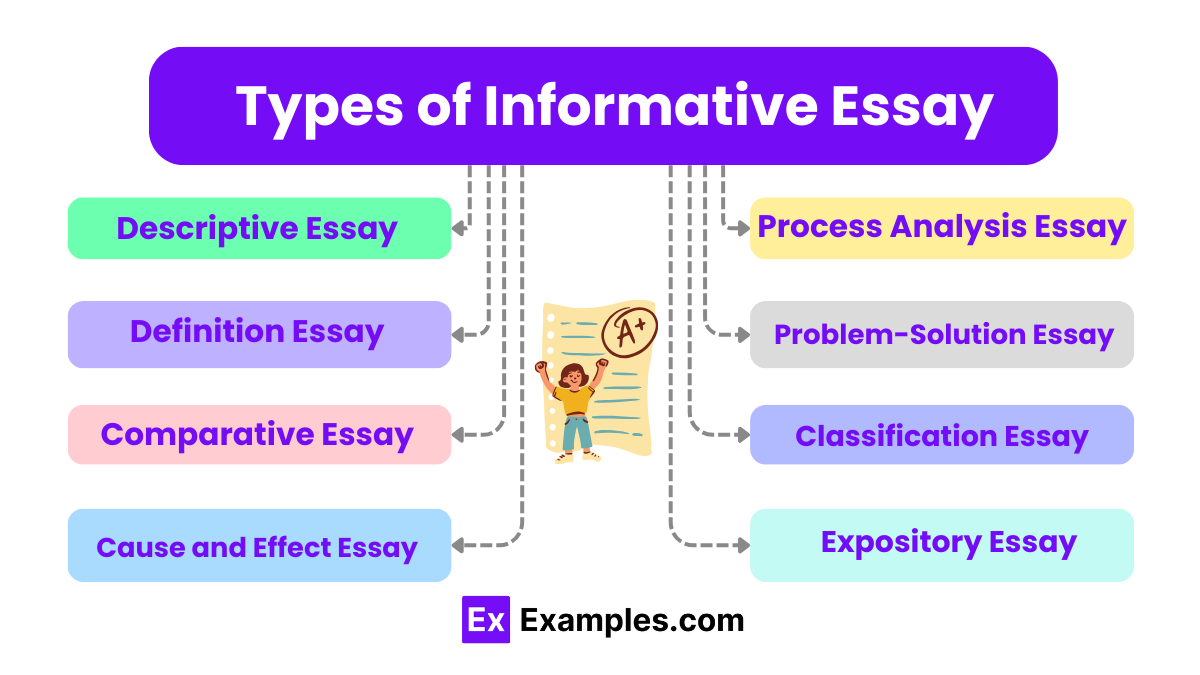
Download This Image
- Descriptive Essay : Provides a detailed description of a person, place, object, or event, using sensory details to paint a vivid picture for the reader.
- Definition Essay : Explores the meaning, history, and implications of a complex concept or term, offering a deep and thorough understanding beyond basic definitions.
- Compare and Contrast Essay : Analyzes two or more subjects by comparing their similarities and contrasting their differences, highlighting the nuances between them.
- Cause and Effect Essay : Examines the reasons why something happened (cause) and the outcomes that followed (effect), aiming to establish a clear relationship between events.
- Process Analysis Essay : Explains how something is done, how something occurs, or how something works, in a step-by-step format, providing clear instructions or insights.
- Problem-Solution Essay : Identifies a specific problem and proposes one or more solutions, focusing on presenting viable and effective ways to address the issue at hand.
- Classification Essay : Organizes or sorts different subjects or objects into categories based on shared characteristics, providing a clear understanding of their relationships and differences.
- Expository Essay : Presents a balanced analysis of a topic, using facts, statistics, and examples, aiming to explain or clarify a subject in a straightforward, unbiased manner.
How is an Informative Essay Structured?
An informative essay is structured in a clear, organized manner to effectively convey information to the reader. This structure consists of three main parts: the introduction, the body paragraphs, and the conclusion. Here’s how each part is typically organized:
- Hook : Begins with a captivating opening to grab the reader’s attention. This could be an interesting fact, a question, or a startling statistic related to the topic.
- Background Information : Provides context for the topic being discussed. This section gives the reader any necessary background information to understand the essay.
- Thesis Statement : Concludes the introduction with a clear, concise statement that outlines the main points or focus of the essay. This statement guides the rest of the essay.
- Topic Sentence : Each body paragraph starts with a topic sentence that introduces the main idea of the paragraph, relating back to the thesis statement.
- Supporting Details : These are facts, examples, or explanations that provide evidence to support the topic sentence. This may include statistics, quotes from credible sources, or logical arguments.
- Analysis : This section interprets the supporting details, explaining how they relate to the topic and the thesis statement. It’s where the writer’s insight comes into play, providing depth to the information presented.
- Transition : Each paragraph ends with a sentence that provides a smooth transition to the next paragraph, maintaining the flow of the essay.
- Summary of Main Points : Begins by briefly summarizing the key points or information presented in the body paragraphs, reinforcing the essay’s main ideas.
- Restatement of the Thesis : Reiterates the thesis statement in light of the information and analysis provided, emphasizing the essay’s main argument or focus.
- Closing Statement : Concludes with a final thought or call to action, leaving the reader with something to ponder or suggesting steps for further exploration of the topic
7 steps for Writing an Informative Essay
- Choose Your Topic : Select a topic that interests you and meets the assignment’s criteria. Ensure it is broad enough to research but narrow enough to be covered in your essay.
- Conduct Research : Gather information from reliable sources to understand your topic thoroughly. Look for facts, statistics, and examples that will provide a solid foundation for your essay.
- Create an Outline : Organize your thoughts and research into an outline. This will help structure your essay logically, ensuring a clear flow of ideas from the introduction through the body paragraphs to the conclusion.
- Write the Introduction : Begin with a hook to capture the reader’s interest, followed by background information to set the context for your topic. Conclude the introduction with a thesis statement that presents the main focus or argument of your essay.
- Develop Body Paragraphs : Each paragraph should focus on a single main idea that supports your thesis. Start with a topic sentence, followed by evidence and examples. Include your analysis to explain how this evidence relates to your topic.
- Conclude Your Essay : Summarize the main points of your essay, restate your thesis in light of the information provided, and offer a final thought or call to action. This is your chance to reinforce the importance of your topic and the information you’ve presented.
- Revise and Edit : Review your essay for any errors or unclear parts. Check for grammar, punctuation, and spelling mistakes. Ensure your writing is clear, concise, and logically organized. It may help to get feedback from others or to step away from your essay for a while before reviewing it again.
Purpose of Informative Essays
Informative essays serve a foundational role in educational and communication contexts, aiming to enlighten the reader on a specific topic or subject matter. The core purpose of these essays is to inform, explain, and educate without presenting the author’s opinion or persuading the reader to adopt a particular viewpoint. Here’s a deeper look into the primary objectives of informative essays:
Educate the Reader
The most direct purpose of an informative essay is to educate its audience. By presenting facts, data, and detailed explanations, the essay seeks to expand the reader’s knowledge on a given subject. This is particularly valuable in academic settings, where understanding diverse topics is essential to a well-rounded education.
Provide Clarity and Insight
Informative essays often tackle complex subjects that may be difficult to understand at first glance. Through clear writing and structured explanation, these essays break down intricate concepts into digestible parts, offering insight and clarity. They help the reader grasp the nuances of topics ranging from scientific theories to historical events and beyond.
Enhance Critical Thinking
By presenting information from various angles and including detailed analyses, informative essays encourage readers to engage in critical thinking. Readers are prompted to consider the hows and whys of the subject matter, analyze the information presented, and connect it to broader contexts or their personal knowledge.
Stimulate Interest
Although the primary aim is to inform, a well-crafted informative essay can also spark interest in the topic. By uncovering intriguing facts or presenting the subject in a compelling manner, the essay can motivate readers to explore the topic further on their own, fostering a culture of learning and curiosity.
Support Academic and Professional Success
In academic settings, informative essays are a tool for students to demonstrate their understanding of a topic, their ability to conduct thorough research, and their proficiency in communicating complex ideas. Professionally, these essays contribute to knowledge sharing within industries, helping individuals stay informed about current trends, innovations, and foundational concepts.
Build Foundation for Further Exploration
Informative essays lay the groundwork for deeper research and exploration. By providing a comprehensive overview of a topic, they equip readers with the basic knowledge necessary to delve into more specialized studies or related subjects, serving as a stepping stone for academic and personal growth.
10+Informative Essay Samples
15+ informative essay examples.
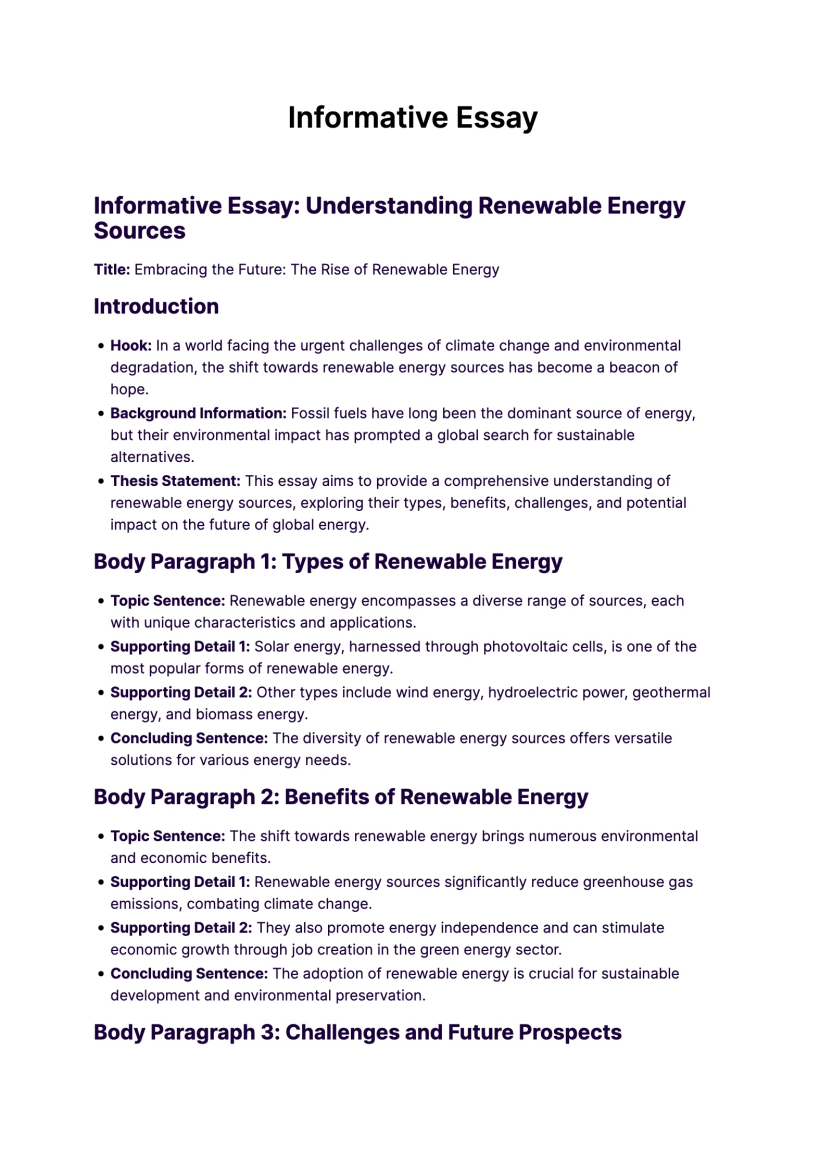
Free Download
Informative Essay Outline
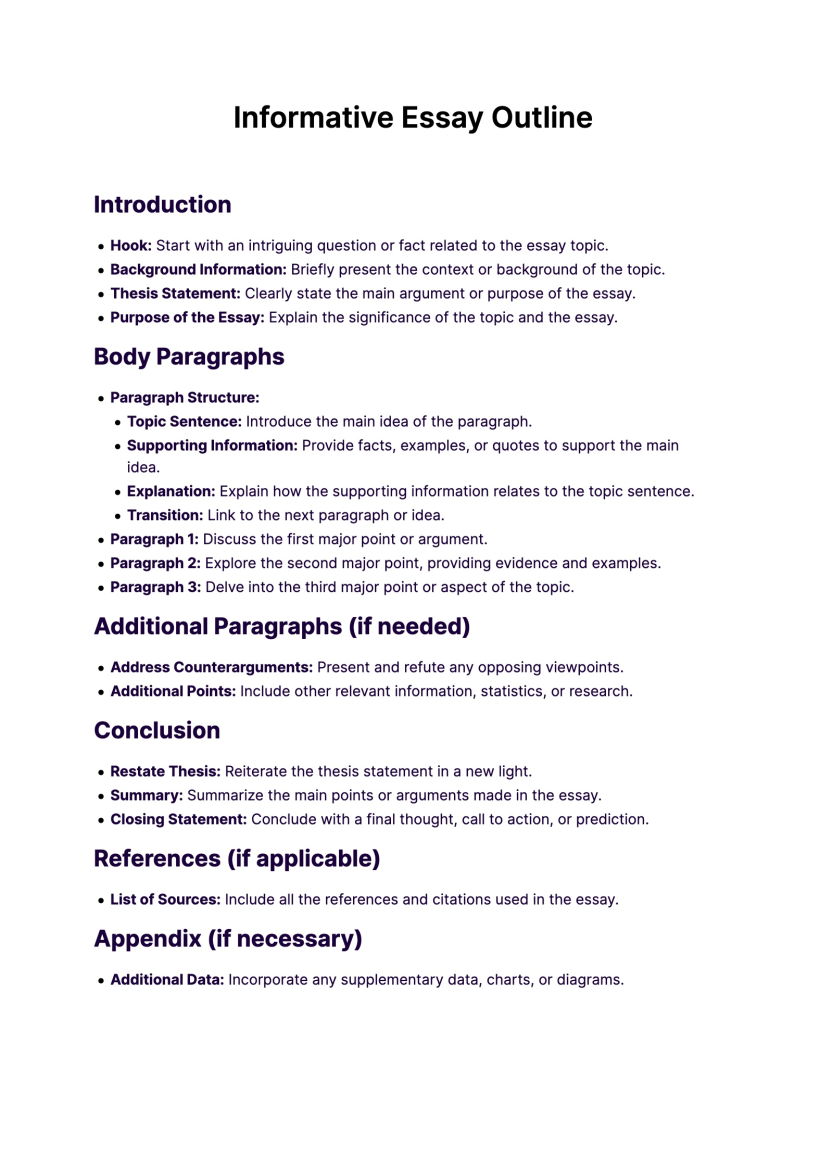
School Informative Essay
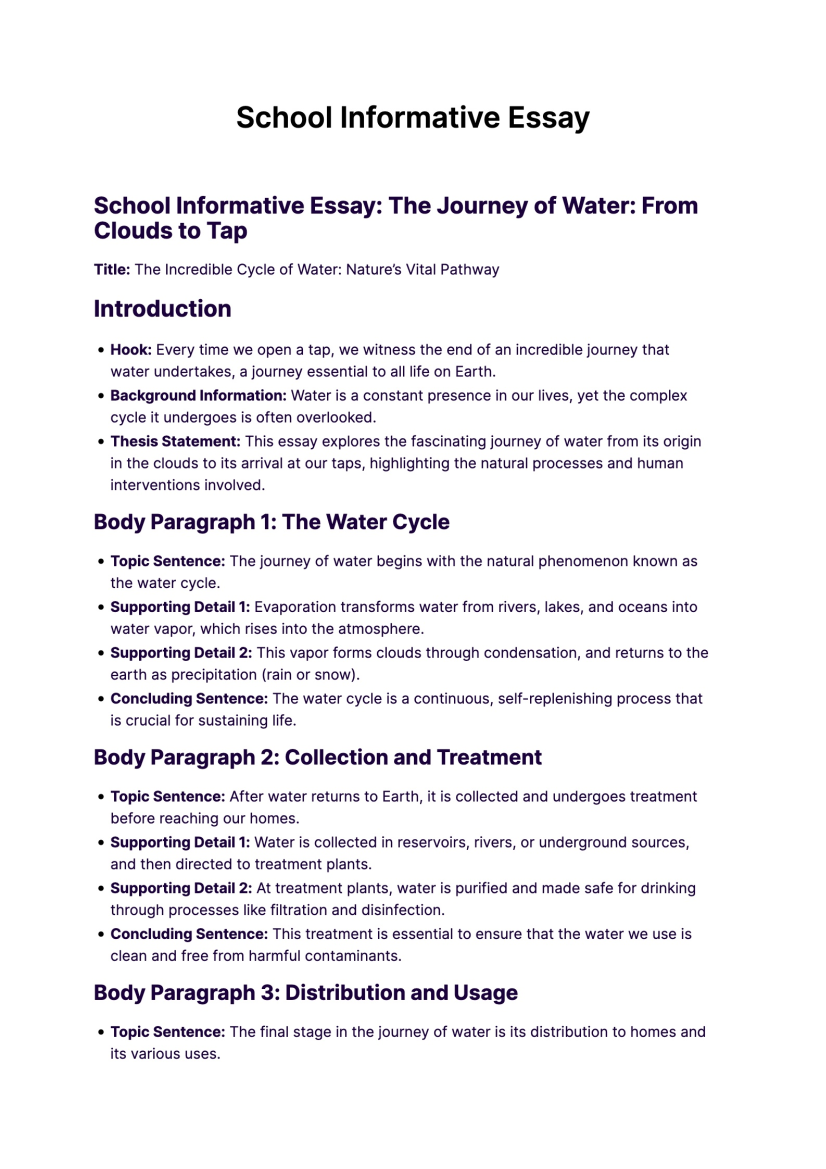
Informative Essay Example
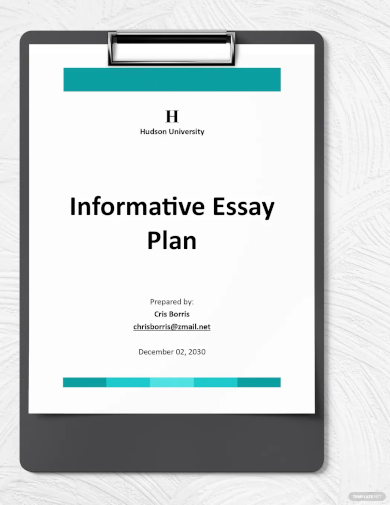
Expository Informative Example
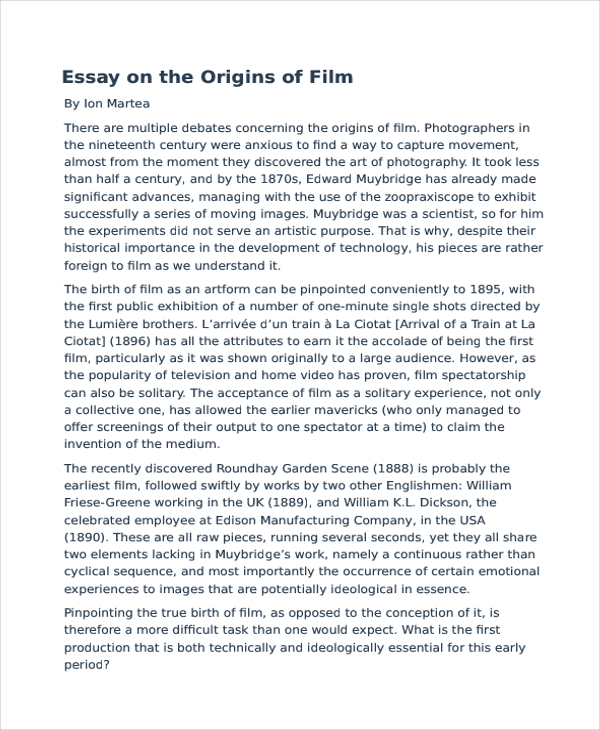
Student Informative Sample
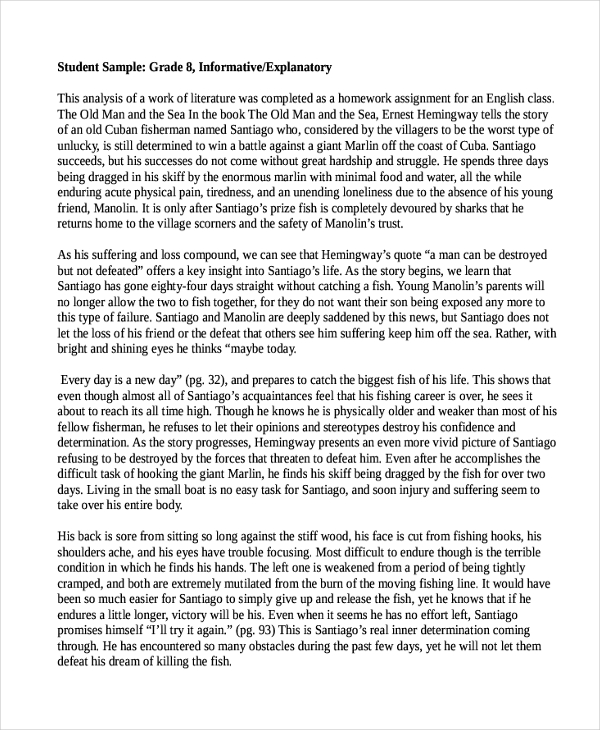
Short Informative Essay
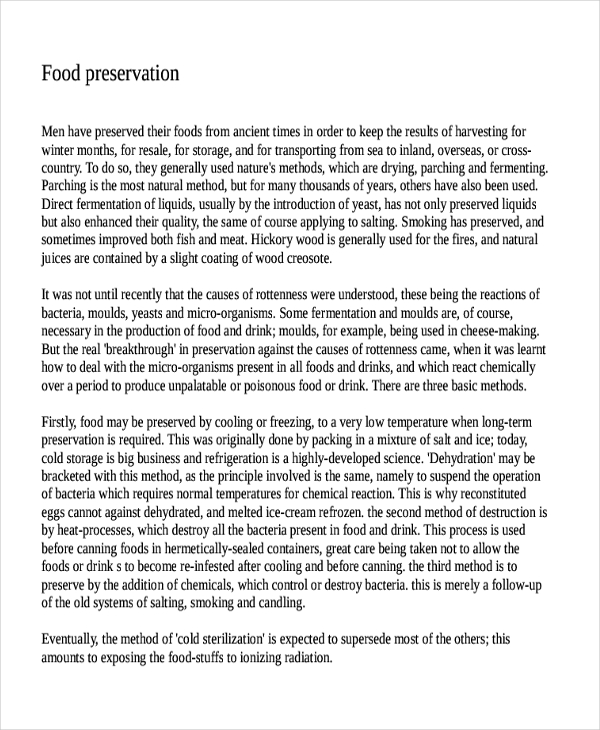
What Is an Informative Essay?
Informative essay is a written as literary essay piece with the purpose of educating a target audience or readers regarding a certain topic or subject.
It is intended to present or expose something while at the same time avoiding to present arguments or personal opinion from the writer. An informative essay is also sometimes called an expository essay in the sense that it also aims to expose or display an information which will be beneficial for the reader.
It does not present bias judgments nor favorable ideas. It does not also dwell in the concept of convincing readers to do things that are contrary to their will.
How to Write an Informative Essay
Writing an informative essay is like telling a blind person what is the color of the sky or telling a kid what are ice creams made of. You simply just have to present a topic and expand.
- Think of a topic. The first thing that you have to do is think of a topic that you want to right about. It would be good if it is something that you are most passionate about so you can write in great details.
- Create a format. The most effective format is using the essential parts of an essay .
- Present your ideas. After choosing the topic, start writing your ideas. Try to present it in a way that you are educating the readers.
College Informative Essay
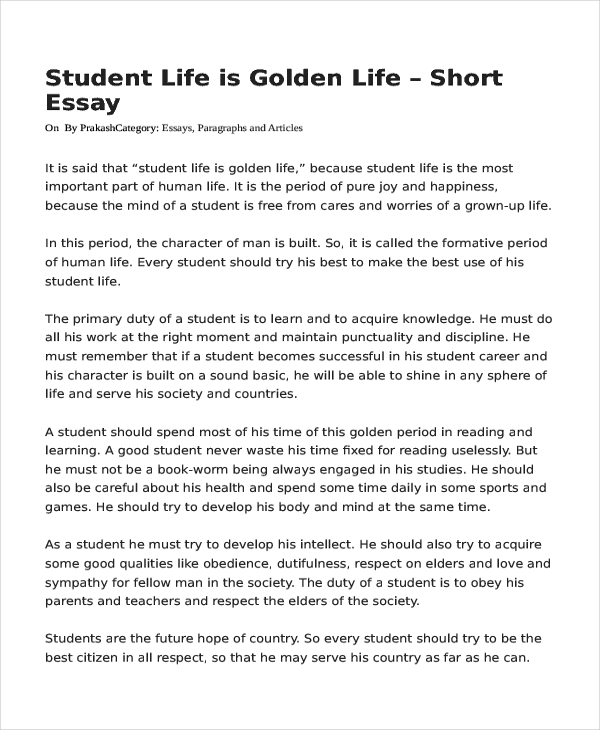
Middle School Informative

Narrative Informative Example
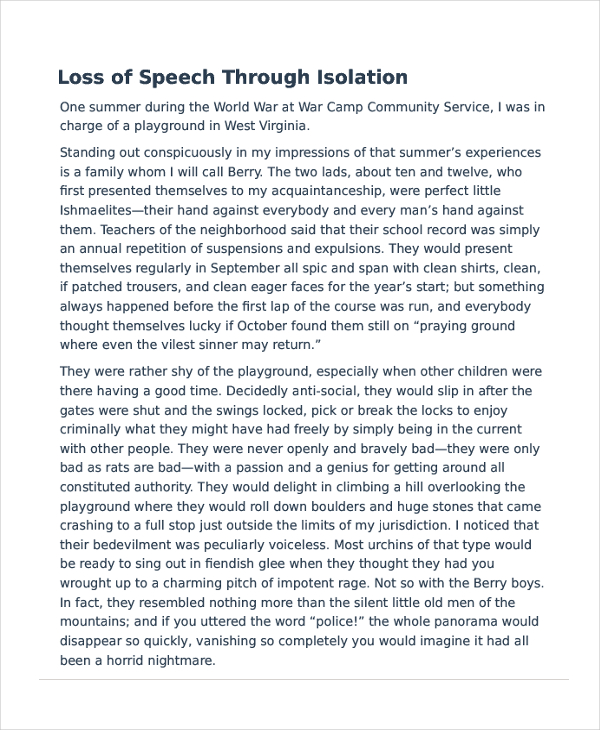
Informative Essay Example
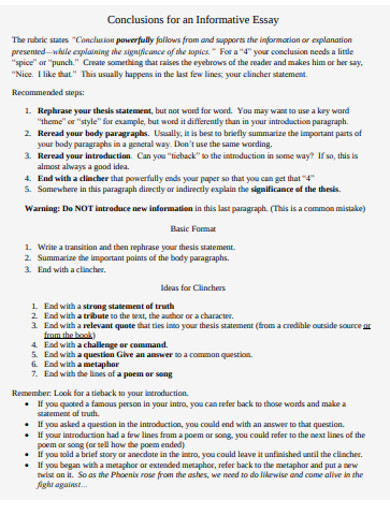
Sample Informative Essay
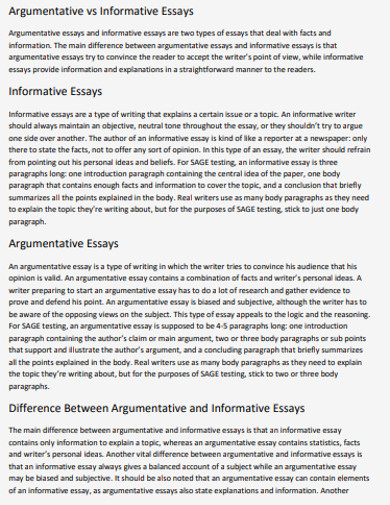
Informative Organizer Essay
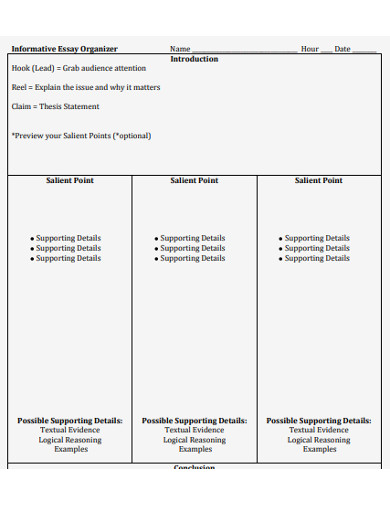
Informative Assignment Essay
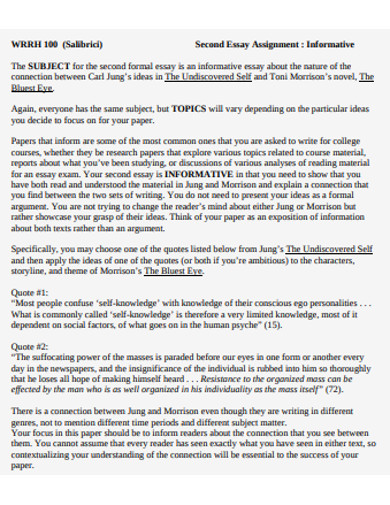
Uses of Informative Essay
1. educational tools.
- Learning and Teaching : Informative essays are widely used in educational settings to teach students about specific topics. They serve as a means for students to research, organize, and present information, enhancing their learning process. For educators, these essays are a tool to assess students’ understanding and ability to communicate knowledge effectively.
2. Enhancing Understanding
- Complex Concept Clarification : These essays break down complex concepts into more understandable parts, making it easier for readers to grasp difficult subjects. They can demystify scientific principles, historical events, or technological advancements, providing clarity and insight.
3. Communication of Ideas
- Knowledge Sharing : In professional and academic communities, informative essays facilitate the sharing of knowledge and ideas. They allow experts to communicate findings, theories, and analyses, contributing to the collective understanding of a field.
4. Awareness and Information Dissemination
- Public Awareness : Informative essays play a crucial role in raising awareness about important issues, such as health, environmental concerns, and social justice. By presenting facts and information, they help inform public opinion and encourage informed decision-making.
5. Basis for Further Research
- Foundation for Exploration : These essays provide a foundation for further research. By offering a comprehensive overview of a topic, they can inspire readers to explore subjects in greater depth, paving the way for advanced studies and discoveries.
6. Professional Development
- Skill Enhancement : Writing informative essays helps individuals develop valuable skills, including research, critical thinking, organization, and writing. These skills are essential in many professional contexts, enhancing career prospects and professional competence.
7. Decision Making and Problem Solving
- Informed Decisions : In the business world and personal life, informative essays can provide the necessary background to make informed decisions. Understanding all aspects of a situation or topic can lead to better problem-solving strategies and outcomes.
8. Cultural and Social Engagement
- Cultural Insight : Essays about cultural practices, societal trends, and historical backgrounds offer readers insights into different ways of life and perspectives, promoting cultural understanding and empathy.
9. Personal Growth
- Intellectual Stimulation : Reading and writing informative essays can be intellectually stimulating, encouraging curiosity and a love for learning. They can broaden one’s horizons and foster a more informed and thoughtful perspective on the world.
Importance of Informative Essay
- Facilitates Learning and Education : They are essential tools in educational settings, helping students learn and understand various topics across different subjects.
- Promotes Critical Thinking : Writing and reading informative essays encourage critical thinking by requiring analysis and synthesis of information.
- Enhances Research Skills : The process of writing an informative essay improves research skills, teaching individuals how to gather, evaluate, and organize information effectively.
- Improves Writing and Communication Skills : Informative essays help in honing writing skills, including structuring arguments, maintaining clarity, and engaging the audience with informative content.
- Encourages Intellectual Curiosity : They stimulate curiosity about the world, encouraging readers and writers to explore topics deeply and broadly.
- Supports Informed Decision Making : By presenting facts and data, informative essays enable readers to make decisions based on knowledge and insights rather than assumptions or misinformation.
- Builds a Foundation for Further Study : They lay the groundwork for more in-depth research and analysis, serving as a stepping stone to more specialized studies.
- Spreads Awareness on Important Issues : Informative essays are a powerful medium for raising awareness about social, environmental, and health-related issues, contributing to public education and action.
- Promotes Cultural Understanding and Empathy : Essays on cultural and societal topics promote understanding and empathy towards different communities and ways of life.
- Contributes to Professional Development : The skills gained from researching and writing informative essays are valuable in professional settings, enhancing abilities in documentation, presentation, and critical analysis.
- Serves as a Source of Inspiration : Reading informative essays can inspire new ideas, hobbies, or even career paths by introducing readers to previously unknown subjects or deeper aspects of familiar topics.
- Facilitates Clear and Effective Information Dissemination : In both academic and professional contexts, the ability to clearly and effectively disseminate information is critical, and informative essays are an excellent medium for this purpose.
How Do You Start an Informative Essay Sentence?
Start an informative essay sentence with a hook such as a surprising fact, a question, or a quote to grab the reader’s attention and draw them into the topic.
How Do You Structure an Informative Essay?
Structure an informative essay with an introduction that includes a hook and thesis statement, body paragraphs that explore the topic in detail, and a conclusion that summarizes the main points.
What Should Each Body Paragraph Begin With?
Each body paragraph should begin with a topic sentence that introduces the main idea of the paragraph, directly supporting the thesis statement.
What Are the Informative Writing Techniques?
Informative writing techniques include using clear and concise language, organizing information logically, employing facts and data for support, and incorporating visuals like charts or graphs to enhance understanding.
How Do You Start an Informative Letter?
Start an informative letter with a polite greeting, followed by a clear introduction of the purpose of the letter. Provide the necessary information in a concise and organized manner.
What Are the Parts of an Informative Essay?
The parts of an informative essay include the introduction with a hook and thesis statement, body paragraphs with topic sentences and supporting details, and a conclusion that summarizes the essay’s main points.
The basic parts or elements of an essay are the introduction, the body, and the conclusion. These are all important parts which of course constitutes the wholeness of your essay.
So each part has to be given with special importance. The conclusion of essay , which is the last part, should be your chance to make your readers understand the whole point of your topic.
This is the chance for you to clarify some important things that you want to highlight. It is advisable that you write at least three to five sentences for your conclusion in order for it not to become too explanatory which you have already done on the previous part.
Informative Essay Generator
Text prompt
- Instructive
- Professional
Crafting the Perfect Thesis for Your Informative Essay
How to Research Effectively for an Informative Essay
Structuring Your Informative Essay: A Step-by-Step Guide
Selecting the Best Topic for Your Informative Essay
The Importance of Editing Your Informative Essay
Incorporating Visuals into Your Informative Essay
Tips for Writing an Engaging Informative Essay Introduction
Developing Strong Arguments in Your Informative Essay
Informative Essay Conclusion: Leaving a Lasting Impression
Avoiding Plagiarism in Your Informative Essay

Grade 7 English Module: Informative Essay
This Self-Learning Module (SLM) is prepared so that you, our dear learners, can continue your studies and learn while at home. Activities, questions, directions, exercises, and discussions are carefully stated for you to understand each lesson.
Each SLM is composed of different parts. Each part shall guide you step-by-step as you discover and understand the lesson prepared for you.
Pre-tests are provided to measure your prior knowledge on lessons in each SLM. This will tell you if you need to proceed on completing this module or if you need to ask your facilitator or your teacher’s assistance for better understanding of the lesson. At the end of each module, you need to answer the post-test to self-check your learning. Answer keys are provided for each activity and test. We trust that you will be honest in using these.
Please use this module with care. Do not put unnecessary marks on any part of this SLM. Use a separate sheet of paper in answering the exercises and tests. And read the instructions carefully before performing each task.
This module was designed and written with you in mind. It is here to help you master the writing of an informative essay. The scope of this module permits it to be used in many different learning situations. The language used recognizes the diverse vocabulary level of students. The arrangement of the lessons follows the standard sequence of the course. But the order in which you read them can be changed to correspond with the textbook you are now using.
The module is mainly about: Informative Essay
Essay writing brings more benefits than browsing the social networking sites. It sharpens your mind and make you more creative than hitting likes and sharing your friends’ posts. The ability to share something from your mind is a plausible act.
One of the basic types of essays that students need to learn is the informative essay. An informative essay is based on facts to educate or inform an audience on a particular topic. An informative essay is the basic type of essays and its primary goal is to educate the reader by communicating facts or proving explanation on a particular topic.
After going through this module, you are expected to:
1. define informative essay;
2. give the characteristics of informative essay; and
3. compose an informative essay.
Grade 7 English Quarter 4 Self-Learning Module: Informative Essay
Can't find what you're looking for.
We are here to help - please use the search box below.
Leave a Comment Cancel reply
Informative Essay — Purpose, Structure, and Examples

What is informative writing?
Informative writing educates the reader about a certain topic. An informative essay may explain new information, describe a process, or clarify a concept. The provided information is objective, meaning the writing focuses on presentation of fact and should not contain personal opinion or bias.
Informative writing includes description, process, cause and effect, comparison, and problems and possible solutions:
Describes a person, place, thing, or event using descriptive language that appeals to readers’ senses
Explains the process to do something or how something was created
Discusses the relationship between two things, determining how one ( cause ) leads to the other ( effect ); the effect needs to be based on fact and not an assumption
Identifies the similarities and differences between two things; does not indicate that one is better than the other
Details a problem and presents various possible solutions ; the writer does not suggest one solution is more effective than the others

Purpose of informative writing
The purpose of an informative essay depends upon the writer’s motivation, but may be to share new information, describe a process, clarify a concept, explain why or how, or detail a topic’s intricacies.
Informative essays may introduce readers to new information .
Summarizing a scientific/technological study
Outlining the various aspects of a religion
Providing information on a historical period
Describe a process or give step-by-step details of a procedure.
How to write an informational essay
How to construct an argument
How to apply for a job
Clarify a concept and offer details about complex ideas.

Explain why or how something works the way that it does.
Describe how the stock market impacts the economy
Illustrate why there are high and low tides
Detail how the heart functions
Offer information on the smaller aspects or intricacies of a larger topic.
Identify the importance of the individual bones in the body
Outlining the Dust Bowl in the context of the Great Depression
Explaining how bees impact the environment
How to write an informative essay
Regardless of the type of information, the informative essay structure typically consists of an introduction, body, and conclusion.
Introduction
Background information
Explanation of evidence
Restated thesis
Review of main ideas
Closing statement

Informative essay introduction
When composing the introductory paragraph(s) of an informative paper, include a hook, introduce the topic, provide background information, and develop a good thesis statement.
If the hook or introduction creates interest in the first paragraph, it will draw the readers’ attention and make them more receptive to the essay writer's ideas. Some of the most common techniques to accomplish this include the following:
Emphasize the topic’s importance by explaining the current interest in the topic or by indicating that the subject is influential.
Use pertinent statistics to give the paper an air of authority.
A surprising statement can be shocking; sometimes it is disgusting; sometimes it is joyful; sometimes it is surprising because of who said it.
An interesting incident or anecdote can act as a teaser to lure the reader into the remainder of the essay. Be sure that the device is appropriate for the informative essay topic and focus on what is to follow.

Directly introduce the topic of the essay.
Provide the reader with the background information necessary to understand the topic. Don’t repeat this information in the body of the essay; it should help the reader understand what follows.
Identify the overall purpose of the essay with the thesis (purpose statement). Writers can also include their support directly in the thesis, which outlines the structure of the essay for the reader.
Informative essay body paragraphs
Each body paragraph should contain a topic sentence, evidence, explanation of evidence, and a transition sentence.

A good topic sentence should identify what information the reader should expect in the paragraph and how it connects to the main purpose identified in the thesis.
Provide evidence that details the main point of the paragraph. This includes paraphrasing, summarizing, and directly quoting facts, statistics, and statements.
Explain how the evidence connects to the main purpose of the essay.
Place transitions at the end of each body paragraph, except the last. There is no need to transition from the last support to the conclusion. A transition should accomplish three goals:
Tell the reader where you were (current support)
Tell the reader where you are going (next support)
Relate the paper’s purpose
Informative essay conclusion
Incorporate a rephrased thesis, summary, and closing statement into the conclusion of an informative essay.
Rephrase the purpose of the essay. Do not just repeat the purpose statement from the thesis.
Summarize the main idea found in each body paragraph by rephrasing each topic sentence.
End with a clincher or closing statement that helps readers answer the question “so what?” What should the reader take away from the information provided in the essay? Why should they care about the topic?
Informative essay example
The following example illustrates a good informative essay format:

EL Education Curriculum
You are here.
- ELA 2019 G7:M2:U2:L9
Write an Informative Essay: Draft an Introduction
In this lesson, daily learning targets, ongoing assessment.
- Technology and Multimedia
Supporting English Language Learners
Materials from previous lessons, new materials, closing & assessments, you are here:.
- ELA 2019 Grade 7
- ELA 2019 G7:M2
- ELA 2019 G7:M2:U2
Like what you see?
Order printed materials, teacher guides and more.
How to order
Help us improve!
Tell us how the curriculum is working in your classroom and send us corrections or suggestions for improving it.
Leave feedback
Focus Standards: These are the standards the instruction addresses.
- W.7.2a, L.7.1a
Supporting Standards: These are the standards that are incidental—no direct instruction in this lesson, but practice of these standards occurs as a result of addressing the focus standards.
- RI.7.1, RI.7.2, W.7.4, W.7.5, W.7.10, L.7.6
- I can write an introduction for my essay giving context on crime detection and epidemiology, clearly stating the focus of the piece. ( W.7.2a )
- Opening A: Entrance Ticket, Unit 2, Lesson 9 ( W.7.2a )
- Work Time A: Annotated, color-coded model informative essay introduction ( W.7.2a )
- Work Time B: Language Dive: Model Essay, Focus Statement note-catcher ( W.7.2a, L.7.1a )
- Closing and Assessment A: Introductory Paragraph of Pair Informative Essay ( W.7.2a )
- Ensure there is a copy of Entrance Ticket: Unit 2, Lesson 9 at each student's workspace.
- Prepare Organize the Model: Introduction strips (one strip per pair) for Work Time A.
- Strategically pair students for work in Opening A with at least one strong reader per pair.
- Cut apart the introduction paragraph strips, and organize them using envelopes or paperclips so that each pair will have one set.
- Review the Informative Writing checklist to become familiar what will be required of students over the remainder of the unit.
- Post the learning targets and applicable anchor charts (see Materials list).
Tech and Multimedia
- Continue to use the technology tools recommended throughout previous modules to create anchor charts to share with families; to record students as they participate in discussions and protocols to review with students later and to share with families; and for students to listen to and annotate text, record ideas on note-catchers, and word-process writing.
Supports guided in part by CA ELD Standards 7.I.A.1, 7.I.C.10, and 7.II.C.6.
Important Points in the Lesson Itself
- To support ELLs, this lesson includes use of manipulatives to understand the key structures of an essay introduction. Also, the collaboration of writing a peer essay supports students.
- ELLs may find it challenging to generate language for writing their introduction. Encourage students to use oral processing and their home language to assist them in articulating their ideas.
- context (A)
(A): Academic Vocabulary
(DS): Domain-Specific Vocabulary
- Close Readers Do These Things anchor chart (one for display; from Module 1, Unit 1, Lesson 4, Opening A)
- Academic word wall (one for display; from Module 1, Unit 1, Lesson 1, Opening A)
- Criteria of an Effective Informative Essay anchor chart (one for display; from Module 1, Unit 2, Lesson 7, Work Time B)
- Domain-specific word wall (one for display; from Module 1, Unit 1, Lesson 1, Work Time B)
- Model Informative Essay: "Computer Programs and Animal Behavior" (for teacher reference) (from Module 2, Unit 2, Lesson 8, Work Time A)
- Informative Writing Plan graphic organizer (example for teacher reference) (from Module 2, Unit 2, Lesson 8, Closing and Assessment A)
- Vocabulary log (one per student; from Module 1, Unit 1, Lesson 2, Opening A)
- Model Informative Essay: “Computer Programs and Animal Behavior” (one per student and one for display; from Module 2, Unit 2, Lesson 8, Work Time A)
- Painted Essay® template (one per student and one for display; from Module 1, Unit 2, Lesson 7, Closing and Assessment A)
- Colored pencils (red, yellow, blue, light green, dark green; one of each per student)
- Informative Writing Plan graphic organizer (one per student; from Module 2, Unit 2, Lesson 8, Closing and Assessment A)
- Informative Writing Plan graphic organizer ▲
- Directions for Pair Informative Essay (one per student; from Module 2, Unit 2, Lesson 8, Work Time A)
- Patient Zero by Marilee Peters (text; one per student; from Module 2, Unit 1, Lesson 1, Work Time C)
- Homework: Read “Crime-Solving Strategies” (one per student; from Module 2, Unit 2, Lessons 6–7, Homework B)
- Independent reading journal (one per student; begun in Module 1, Unit 1, Lesson 6, Work Time B)
- Entrance Ticket: Unit 2, Lesson 9 (for teacher reference)
- Organize the Model: Introduction strips (for teacher reference)
- Language Dive Guide: Model Informative Essay, Paragraph 1 (answers for teacher reference)
- Writing implement (red)
- Language Dive: Model Informative Essay, Paragraph 1 note-catcher (for teacher reference)
- Informative Writing checklist (example for teacher reference)
- Entrance Ticket: Unit 2, Lesson 9 (one per student)
- Organize the Model: Introduction strips (one strip per pair)
- Colored pencils (red, green; one of each per student)
- Language Dive: Model Informative Essay, Paragraph 1 note-catcher (one per student)
- Language Dive: Model Informative Essay, Paragraph 1 sentence chunk strips (one per pair of students)
- Informative Writing checklist (one per student and one to display)
- Lined paper (one per student)
- Online or print dictionaries (including ELL and home language dictionaries)
Each unit in the 6-8 Language Arts Curriculum has two standards-based assessments built in, one mid-unit assessment and one end of unit assessment. The module concludes with a performance task at the end of Unit 3 to synthesize students' understanding of what they accomplished through supported, standards-based writing.
Copyright © 2013-2024 by EL Education, New York, NY.
Get updates about our new K-5 curriculum as new materials and tools debut.
Help us improve our curriculum..
Tell us what’s going well, share your concerns and feedback.
Terms of use . To learn more about EL Education, visit eleducation.org
- Grades 6-12
- School Leaders
Win 10 Summer Reading Books from ThriftBooks 📚!
70+ Fascinating Informative Essay Topics for Kids and Teens
Tell them what you know.

Informative essays are a chance to show what you know. They’re all about informing the reader, without trying to persuade or offer an opinion. Informative writing can include how-to process essays, biographical writing, an in-depth analysis of a topic, research papers, or compare-and-contrast essays . Just remember to stick to the facts, and be clear and descriptive. These informative essay topics offer something for all interests and ages.
How-To Informative Essay Topics
Social studies informative essay topics, science informative essay topics, pop culture informative essay topics.
Teach your reader the steps or process to:
- Cook a recipe
- Set a table
- Make a quilt
- Change a tire
- Start a recycling program
- Play a game
- Build a birdhouse
- Plant a garden
- Make and care for a compost pile

- Care for an animal
- Start a business
- Catch a fish
- Tie a necktie
- Train for a marathon
- Prepare a campsite
- Make a campfire
- Clean a room
- Wrap a gift
- Plan a party
- Kick a bad habit
- Use social media responsibly
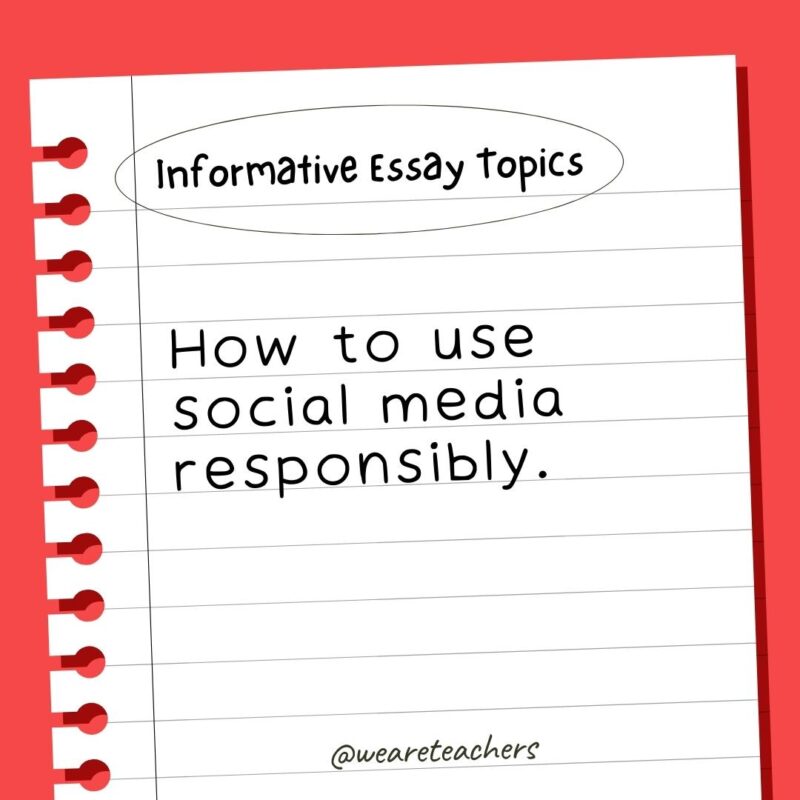
- Manage time effectively
- Make a budget
- Describe the life of a world leader.
- How has the role of women in the workplace changed in the last hundred years?
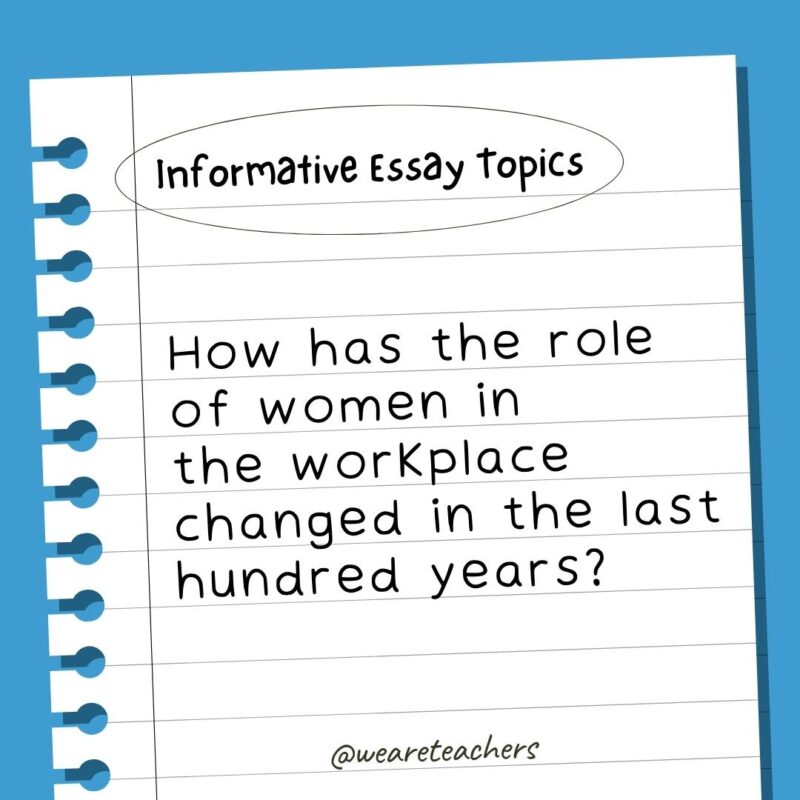
- Explore the current path to becoming an American citizen.
- What are some of the possible ways the pyramids were built?
- Describe a time period in history.
- How does one country’s economy affect another country?
- What is the difference between socialism and communism?
- Explore the benefits and drawbacks of legalizing drugs.
- Describe the political system in a foreign country.
- Explore the causes of a specific war or armed conflict in history.
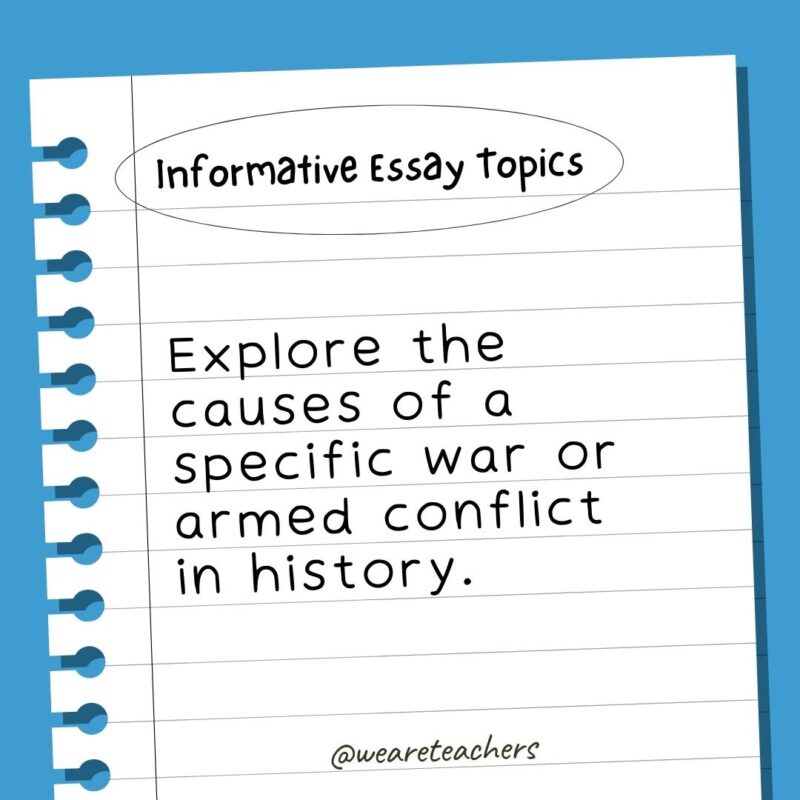
- How is a new law passed in the United States?
- Give an overview of the history of any country, state, or city.
- Describe the three branches of American government.
- Explain how the American judicial system works.
- Describe the evolution of fashion throughout history.
- Describe a science experiment, including the hypothesis, process, and conclusion.
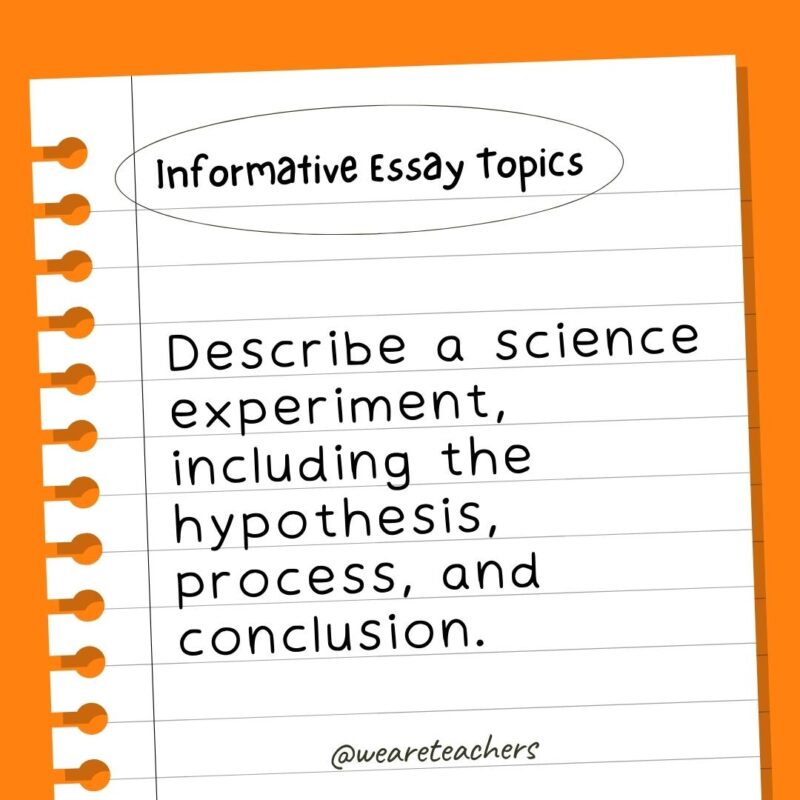
- Explain what it means to lead a healthy lifestyle.
- What is the relationship between calories and fat?
- What is the physics behind a bicycle?
- How do plants convert sunlight into energy?
- Describe any element from the periodic table, including its makeup and uses.
- What is the difference between a crocodile and an alligator?
- Describe the life cycle of any animal.
- What are the benefits of recycling?
- Describe the life of a prominent scientist.
- Explain what E = mc 2 means.
- Describe any disease, including its symptoms and treatments.
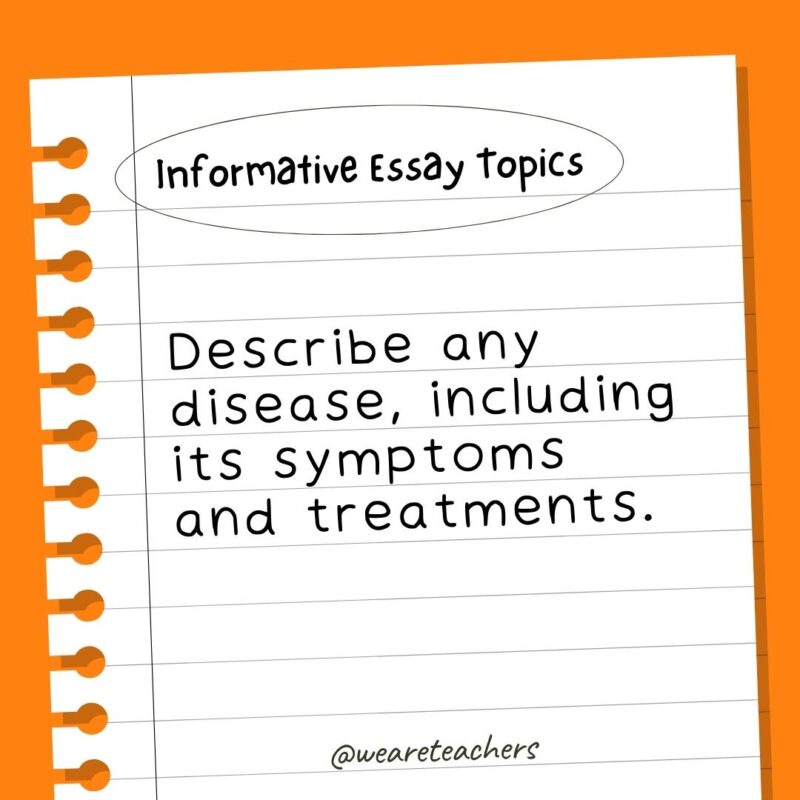
- Why do leaves change color in the fall?
- Explain the difference between climate and weather.
- Describe a specific ecosystem, including the plants and animals that live there.
- Describe the history of video games.
- What are recent trends in the video game industry?
- Describe your favorite superhero.
- Explain the motivations of any fictional villain.
- Describe the life of your favorite celebrity.
- Explore the development and growth of a main character in any book series.
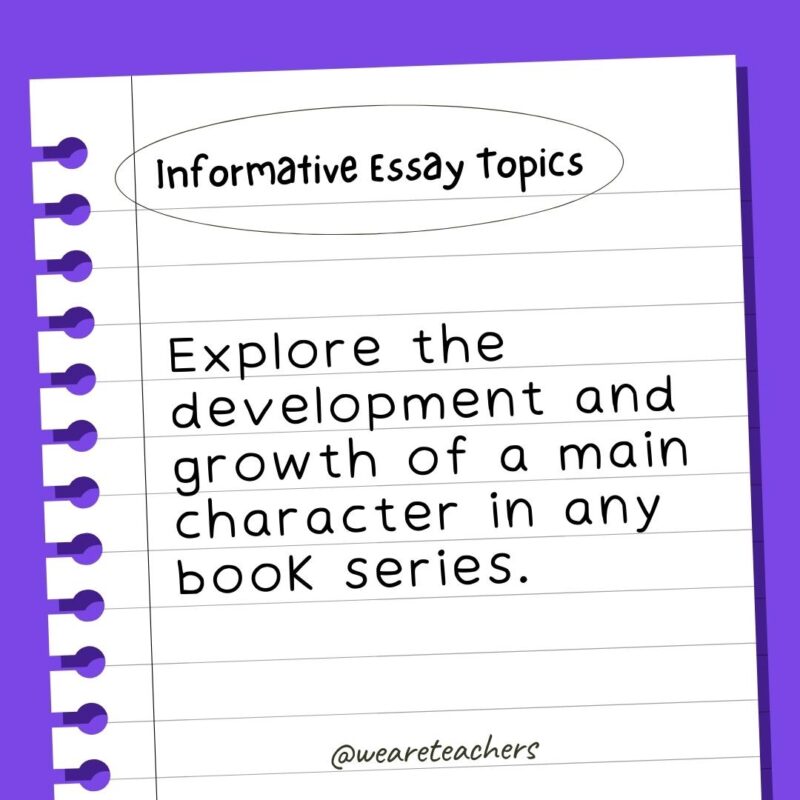
- Describe the process of making a movie or TV show.
- Tell the story of any band, including its founding, successes and challenges, and breakup (if applicable).
- Describe the life of a famous artist.
- Explore the history of Disney World (or any theme park).
- Plan the perfect fantasy football league team.
- Describe popular trends and fads from any decade.
- Explore the history of the Olympics.
- Describe the music of a generation and how it reflected that time.
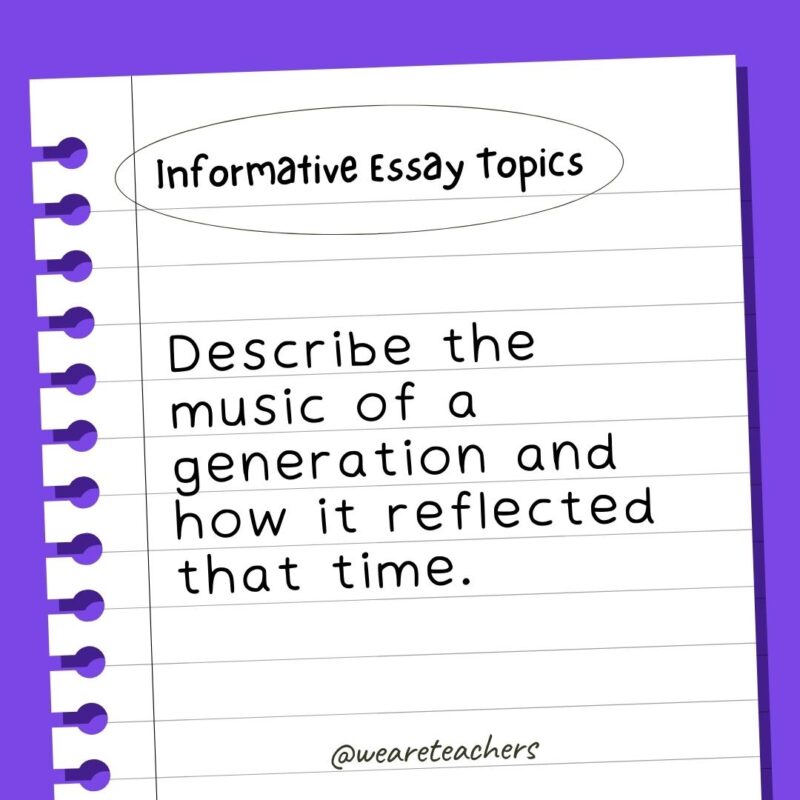
- Explain the history of the internet.
What are some of your favorite informative essay topics? Come share your ideas in the WeAreTeachers HELPLINE group on Facebook .
Plus, check out the big list of essay topics for high school (100+ ideas).
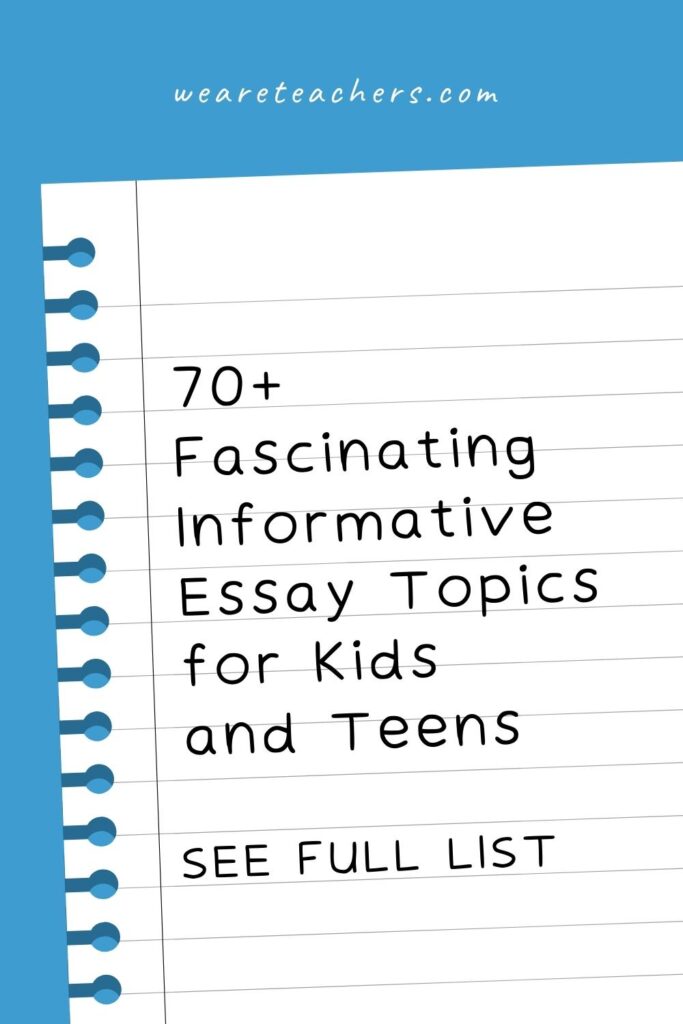
You Might Also Like

The Big List of Essay Topics for High School (120+ Ideas!)
Ideas to inspire every young writer! Continue Reading
Copyright © 2024. All rights reserved. 5335 Gate Parkway, Jacksonville, FL 32256
Writing Prompts for 7th Grade
Compassionate Eye Foundation/Robert Kent/Getty Images
- Lesson Plans
- Grading Students for Assessment
- Becoming A Teacher
- Assessments & Tests
- Elementary Education
- Special Education
- Homeschooling
:max_bytes(150000):strip_icc():format(webp)/squareheadshot-5b6da9aec9e77c0050a6e8a5.jpg)
By seventh grade, students should be refining the core writing skills of brainstorming , researching, outlining, drafting, and revising. In order to hone these skills, seventh-grade students need regular practice writing a variety of essay styles, including narrative, persuasive, expository , and creative essays. The following essay prompts offer age-appropriate starting points to help seventh graders flex their writing muscles.
Narrative Essay Writing Prompts
Narrative essays share a personal experience to tell a story, usually to make a point rather than merely to entertain. These narrative essay prompts encourage students to describe and reflect on a story that's meaningful to them.
- Embarrassing Pasts - As people get older, they are sometimes embarrassed by things they used to like, such as toys, television shows, or nicknames. Describe something that you used to enjoy that you now find embarrassing. Why is it embarrassing now?
- Bonds of Hardship - Sometimes difficulties draw families closer. Describe something that your family endured together that strengthened your relationships.
- There’s No Place Like Home - What makes your hometown special? Explain this special quality.
- New Kid in Town - Being new to a town or school can be challenging because you don’t know anyone, or exciting because no one knows you and your past. Describe a time when you were the new kid.
- Finders Keepers - Write about a time when you lost (or found) something of value. How did that experience affect your opinion of the saying, “Finders keepers; losers weepers?"
- Follow the Leader - Describe a time when you were in a leadership role. How did it make you feel? What did you learn from the experience?
- April Fools - Write about the best prank you’ve ever played on someone (or had played on you). What made it so clever or funny?
- Bon Appetit - Special meals can be powerful memory-makers. Write about a specific meal that stands out in your memory. What made it so unforgettable?
- Bon Voyage - Family trips and vacations also create lasting memories. Write an essay detailing your favorite family vacation memory.
- Batter Up - Write about a valuable lesson that you learned while playing your favorite sport.
- Best Friends Forever - Describe your friendship with your BFF and what makes it so important to you.
- The Real Me - What is one thing you wish your parents, teachers, or coaches really understood or knew about you?
- TV - Explain what makes your favorite television show so enjoyable or relatable to you.
Persuasive Essay Writing Prompts
Persuasive essays use facts and reasoning to convince the reader to embrace the writer’s opinion or take a course of action. These essay prompts empower seventh graders to write persuasively about an issue they genuinely care about.
- Outdated Laws - What is one law or family or school rule that you think needs to be changed? Convince lawmakers, your parents, or school leaders to make the change.
- Bad Ads - Advertising can have a powerful impact on consumers. What is a product that you’ve seen advertised that you don’t think should be? Explain why the media should quit showing these ads.
- Puppy Love - You want a pet, but your parents don’t think you need one. What would you say to change their minds?
- Lights, Camera - What is your favorite book of all time? Write an essay convincing a producer to make a movie about it.
- Snooze Button - Studies have shown that tweens and teens need more sleep. Write a proposal for a later school start time.
- Body Shop - Magazines can negatively impact their readers’ body image by using edited images of models. Convince a teen magazine publisher that they should not use heavily-edited model images in their publication.
- It Can’t Be Over - The network is canceling your favorite television show. Write a paper convincing the station that they’re making a mistake.
- Curfews - Some malls have policies forbidding kids under 18 to be at the mall without adult supervision during certain times. Do you think this is fair or unfair? Defend your position.
- Team Spirit - Should homeschooled students be allowed to play sports on public or private school teams? Why or why not?
- Smartphones - All of your friends have the latest smartphone, but you only have a “dumb phone.” Should your parents upgrade your phone, or are smartphones for middle school kids a bad idea?
- Bullies - Some dogs, such as pit bulls or Dobermans, are labeled “bully breeds.” Is this label deserved or undeserved?
- Money Can’t Buy You Love - People say that money can’t buy happiness, but some studies have shown that people with higher incomes may be happier . Do you think this is true? Why or why not?
- Ratings - There are age restrictions on movies and video games, ratings on television shows, and warning labels on music. Computers and smartphones offer parental controls. Do adults have too much control over what kids watch and listen to or do these restrictions serve a valuable purpose?
Expository Essay Writing Prompts
Expository essays describe a process or provide factual information. These prompts can serve as jumping-off points for the explanatory process.
- School’s in Session - Would you rather attend public school, private school, or be homeschooled. Explain the benefits of your choice.
- Admiration - Who do you admire from your life or history? Write an essay describing how their character or contributions to their community have earned your respect.
- Global Community - If you could live anywhere in the world, where would you live? Write about your dream hometown and why you want to live there.
- Peer Problems - Peer pressure and bullying can make life as a middle school student difficult. Describe a time you were pressured or bullied and how it affected you.
- Order Up - A friend wants to learn how to make your favorite food. Detail the process, step-by-step, so your friend can recreate the dish.
- Addictions - Many people are impacted by drug or alcohol addictions. Share facts about how the use of these substances negatively affects families or communities.
- Serve Others - Community service is a valuable experience. Describe a time you volunteered. What did you do and how did it make you feel?
- City or Country Mouse - Do you live in a big city or a small town? Explain why you do or don’t like living there.
- Aspirations - What do you want to be when you’re an adult? Explain why you’d choose that career or what you’ll do to prepare for it.
- Point in Time - Sometimes people bury time capsules so future generations can learn about the past. What would you include to give an accurate snapshot of life in the current time?
- Hobbyist - You’re friend wants to take up your favorite hobby. Explain it to him.
- SOS - A natural disaster has destroyed homes and businesses in a nearby city. Describe what you can do to help.
- Wonder Twin Power - Some superheroes can fly or become invisible. If you could have any superpower, what would it be and why?
Creative Essay Writing Prompts
Creative essays are fictional stories. They use plot, character, and dialog to engage and entertain the reader. These prompts will get the creative juices flowing.
- Fan Fic - Write a story about your favorite characters from a book, film, or television show.
- Cats vs. Dogs - You have two pets of different species. Write a story from their point of view about a day at home alone.
- Time Travel - You find a time machine in your backyard. What happens when you step inside?
- Dream State - Think about a time when you woke in the middle of a vivid dream. What would have happened if the dream hadn’t been interrupted?
- New Door - You’ve just discovered a door that you’ve never seen before. What happens when you walk through it?
- Secret Keeper - You find out your best friend has kept a secret from you. What is the secret and why didn’t your friend tell you?
- Fridge Fun - Write a story from the perspective of an item in your refrigerator.
- Desert Island - You’ve just discovered an uncharted island. What happens next?
- Fly on the Wall - You see two people talking excitedly, but you can’t hear what they’re saying. Write a story about what they might be saying.
- Special Delivery - You receive a battered package in the mail. Write a story about its journey from the sender to you.
- A Mile in My Shoes - You find a pair of shoes in the thrift store and put them on. Suddenly you find yourself transported into someone else’s life. Describe what happens.
- Mission to Mars - Imagine that you’re a pioneer to start a colony on Mars. Write about a typical day on your new planet.
- Snow Days - You find yourself snowed in for a week with your family. There is no electricity or phone service. What do you do for fun?
- Writing Prompts for 5th Grade
- First Grade Writing Prompts
- Second Grade Writing Prompts
- Engaging Writing Prompts for 3rd Graders
- 4th Grade Writing Prompts
- 24 Journal Prompts for Creative Writing in the Elementary Classroom
- Fun March Writing Prompts for Journaling
- Writing Prompts for Elementary School Students
- February Writing Prompts
- November Writing and Journal Prompts
- 49 Opinion Writing Prompts for Students
- Journal Writing Prompts for Easter
- The 2021-22 Common Application Essay Prompts
- 40 "Back From Christmas Break" Writing Prompts
- Creative Journal Topics Involving Different Perspectives
- Writing Prompt (Composition)
7+ Explanatory Essay Examples That Get the Best Grades

Table of contents

Meredith Sell
Writing explanatory essays is hard, even for experienced scholars.
In this post, I want to try to tackle the major challenges students face when writing this type of essay, using examples of successful essays. These challenges include:
- Struggling to come up with the right idea . (solution: brainstorming techniques )
- Difficulty in organizing the essay. (solution: working on the outline of the essay)
- Not having enough evidence or sources to back up points. (solution: doing proper research )
- Failing to come up with a conclusion. (solution: following our guide to conclusions )
- Not having enough knowledge of the topic. (solution: summarizing key articles on the topic)
- Having trouble finding the right words. (solution: writing with Wordtune )
- Not having enough time to finish the essay. (solution: working on student time management )
- Not being able to present arguments effectively. (solution: learning essay persuasion techniques )
As you can see, for every issue there is the relevant solution, but it takes time to implement it. Another way of tackling this essay is to see other people's essay examples and getting inspiration from them.
Write your explanatory essay faster with this FREE AI tool > Write your explanatory essay faster with this FREE AI tool >

What Is an Explanatory Essay?

If you google “explanatory essay”, you’ll find a bunch of sites saying that an explanatory essay is the same as an expository essay, or that it’s totally different, or not even mentioning that expository essays exist. Who’s right?
Answer: Whoever your professor agrees with.
No, seriously. Your professor decides the parameters of your assignment. So if your professor defines an explanatory essay as one that describes a perspective or analyzes the efficacy of, for example, a local housing policy—that’s the definition you should work from.
But if your professor distinguishes between explanatory essays (which simply explain what something is and how it works or was developed) and expository essays (which expose the reality of a person, place, thing, or idea through investigation and evaluation), you should distinguish between them as well.
For the purposes of this piece, we’re going to use explanatory and expository interchangeably. The dividing line that some draw between these essay types is unnecessarily technical. What’s important is that both:
- Use an objective perspective
- Let the facts speak for themselves
As long as your essay does the same (and includes analysis if required by your professor), you should be in good shape.
Example of explanatory essay
We wrote a whole article on generating essay topic ideas , but here is a good example that can help you get an idea for your own essay:
Why is having a dog as a pet such a wonderful experience?
Dogs are one of the most popular pets in the world. They are beloved companions that bring joy and happiness into the lives of their owners. Dogs have been domesticated for thousands of years and have evolved to become the perfect pet for humans. In this essay, I will explain why having a dog as a pet is a wonderful experience.
One of the primary benefits of having a dog as a pet is the companionship they offer. Dogs are social animals that thrive on human interaction. They are loyal and loving creatures that are always there for their owners. Dogs can help alleviate feelings of loneliness and depression, and provide comfort and support during difficult times.
Another benefit of having a dog as a pet is the health benefits they offer. Studies have shown that owning a dog can help lower blood pressure, reduce stress, and improve overall health. Dogs require daily exercise, which encourages their owners to be more active and can lead to a healthier lifestyle. Additionally, having a dog can boost the immune system and reduce the risk of allergies and asthma in children.
Dogs are also great for families with children. They can help teach children about responsibility, compassion, and empathy. Children can learn to care for and nurture their pets, which can be beneficial for their emotional development. Dogs are also great playmates for children and can provide hours of entertainment and fun.
Training and caring for a dog can also be a rewarding experience. Dogs can be trained to perform a variety of tasks, such as fetching, obedience, and even therapy work. The process of training a dog can help strengthen the bond between the owner and the dog and can be a fulfilling experience. Additionally, caring for a dog requires daily attention and can provide a sense of purpose and fulfillment for the owner.
In conclusion, having a dog as a pet can be a wonderful experience. Dogs offer companionship, health benefits, and can be great for families with children. Caring for a dog can also be a rewarding experience and can provide a sense of purpose and fulfillment for the owner. Owning a dog is a big responsibility, but the rewards far outweigh the effort required.
Example of an explanatory paragraph, generated with AI:

A few subtypes of explanatory essays:
Description or definition essay example
Perhaps the most basic, this subtype does the deceptively simple work of, well, describing or defining a concept, place, person, etc.
Example: How Suspension Bridges Work
This essay explains: The way suspension bridges are constructed and how their design enables them to carry such immense weight.
Cause-and-effect essay example
This type of essay hones in on a particular phenomenon to show what caused it (i.e., where it came from) and how it influences other things.
Example: How Federally Funded Highways Transformed the United States
This essay explains: The history of federally funded highways in the U.S., when federal programs to fund highway construction started, why politicians and others thought highways were important, and what the effect has been on the landscapes, communities, economies, and ecosystems of the country.
Compare-and-contrast essay example
Take two or more things, gather the facts about them, and then write about their similarities and differences.
Example: Hybrid vs. Electric Cars
This essay explains: The various features of hybrid and electric cars, and shows how they are either different or similar in terms of: cost, energy consumption, size, drive time, ease of use, and so on.
How-to essay example
Walk your reader step-by-step through a procedure so they can do it for themselves. (We’re doing this later!)
Example: How to Prepare for an Intercontinental Bike Trip
This essay explains: How to get ready for a bike trip between nations and continents. Readers learn how to research their route, find out what travel documents they need, choose the right gear, and determine how much training they should do before leaving.
Problem and solution essay example
Explain a problem (along with its causes and effects) and then describe one or more potential solutions to that problem. This subtype could also be combined with compare-and-contrast to determine the most effective solution.
Example: How Bike Infrastructure Could Solve American Obesity
This essay explains: How American reliance on motorized vehicles promotes a sedentary lifestyle that drives obesity, whereas building bike lanes and trails could encourage Americans to be more active and improve their health one pedal at a time.
Chronology essay example
Explain the history or backstory of a person, place, thing, or idea in chronological order.
Example: The Evolution of the Bicycle
This essay explains: The initial invention of the bicycle and how its shape, frame, and size changed over the years.
What type of explanatory essay are you writing? Hopefully, this list helped you hone in. Now, let’s start the writing process.
5 Steps to Write Your Essay
Whether you’re writing an explanatory/expository essay or a persuasive essay, the process of researching and writing is pretty much the same. Both genres require research, organization, and thought . But with expository essays, the thought focuses on making sure you understand your topic inside-out and determining the best way to explain it, while with persuasive essays, you’re focused on crafting a convincing argument.
Follow these steps to turn that blank page into a final manuscript:
1. Choose topic and angle.
Do you have free rein to write about the topic of your choice? Make the most of it.
In college, my public speaking professor let us choose all of our own speech topics. A classmate gave an explanatory presentation on how to survive the zombie apocalypse . She brought props and had the class totally enchanted. Our professor encouraged creativity, so I’m sure she earned a winning grade—and had fun in the process.
You can’t use props or sound in a written essay, but you can still work some creative magic. That magic starts with choosing your topic and angle.
To choose well, first make sure you understand the assignment:
- What exactly has your professor asked you to write? Which of the subtypes should your piece be?
- Are there any parameters for what type of topic you can write about?
- What kind of class is this? An English composition class will offer more freedom than, say, a history class focused on the French Revolution.
If you’re allowed to write about anything, brainstorm a list of topics you’re curious about. Then think of smaller topics within that area.
Example: Transportation
- Electric cars
- The highway system
- Engineering
Any of these topics you could easily write volumes about, so next, narrow down to your specific angle. One way I like to come up with angles is to think of how two or three different topics intersect.
Example 1: electric cars + the highway system
Angle: How Much Will It Cost to Update Federal Highways with Charging Stations for Electric Cars
Notice that this angle includes a third element: cost
Example 2: bicycles + bridges
Angle: The Safest Bridges for Bicycles Have One Thing in Common: No Cars
Third element: safety
Example 3: electric cars + buses
Angle: Electric Cars vs. Buses: Which Is Better for the Environment?
Third element: environment
Your turn: Make a list of topics you’re interested in. Then, identify some intersecting topics. Based on your assignment parameters, develop an angle that narrows your focus to an intersection that interests you.
Not sure what angle to go with? Do some broad research on your topics and then return to this step.
2. Research, research, research.
Explanatory essays require solid research. These essays exist to lay out the facts for the reader so they can clearly understand the topic. Your opinion—what you think about electric cars or suspension bridges or transportation infrastructure—doesn’t matter. And it doesn’t belong here.
Where you should start your research depends on how much knowledge you already have.
If you’re writing about suspension bridges and you already know the Brooklyn Bridge and Golden Gate Bridge are suspension bridges, you probably don’t need to start with the encyclopedic entry for “suspension bridges”. But if you don’t know the basic facts about your topic, encyclopedias are a great place to start.
Thanks to the advances of technology—and this marvelous thing called the internet—you don’t have to go to a research library to gain that ground-level knowledge of your topic. But you do still need to make sure you’re drawing from credible sources.
For encyclopedias, try these to start:
- Encyclopedia.com
Dictionaries can be helpful too:
- Merriam-Webster
- Dictionary.com
Once you know your topics’ basic facts, focus on researching those topics in the context of your angle . It may help to make a list of questions you’re trying to answer so you can keep your research focused.
Example: Electric Cars vs. Buses: Which Is Better for the Environment?
- Are most buses gas-powered or electric?
- What’s the average emissions of greenhouse gas from gas-powered buses?
- How much energy do electric cars use? What’s the lifespan of their batteries? Are they just using electricity that was produced in a polluting way somewhere else? What about electric buses?
- How many people can ride a bus? How many people typically are transported by one car?
- What would be the average energy consumption per person in an electric car versus a bus?
Once you know the questions you need to answer, look for sources that address those questions. For an academic essay, you’ll probably want to stick with academic sources : peer-reviewed studies and research papers published by academic journals. But official government databases can also be useful. And news stories from reputable publications can provide some direction as well (check with your professor to see whether or not you can use news publications as sources for your essay). Your educational institution likely provides access to all of these kinds of sources through the university library.
Your turn: Think through your angle and make a list of questions your piece needs to answer. Next, start searching academic databases for the information you need. Take notes as you research, and be sure to save any links, titles, author names, page numbers, and publication information you’ll need to properly cite your sources.
3. Outline your essay.
Call me crazy, but I actually think this is the fun part. I hated writing outlines when I was in school, but since making my living as a professional writer, they’ve become the #1 way I beat writer’s block.
First: Throw out the idea that your outline should be a series of bullet points neatly organized into sections and subsections. Your outline only needs to make sense to you , so play around to find an approach that works with your brain. The idea here is simply to make a map you’ll follow when you sit down to write.
Here’s what I do:
- Identify the specific hook I’m going to use to start things off.
- List the different examples and details I need to include.
- Use the main focus or idea of my piece to order everything in a natural, logical way.
A lot of times, my outline becomes a combination of bullet points and sentences or paragraphs I write as I’m sketching out the piece. I’m basically just thinking the piece through, from beginning to end. Instead of getting stuck while I’m writing, I work through the tough spots in the outlining stage.
This is what my outline looked like for this piece:

Okay, that’s kind of long, so I cut it off early—but you get the point.
A lot of times, my outline starts as bare-bones bullets. As I work on it, ideas pop up that I stick in where they make sense. But when I write, those elements might move around ( notice how the examples of transportation essays got bumped up to the section on subtypes of essays ).
Your outline is just a guide. It’s not an architect’s blueprint that needs to be followed to the exact millimeter. There’s room for things to change.
But an outline keeps you on-track when you’re writing . If you find yourself stuck (or lost) in the writing step, reference your map. You might need to backtrack, move what you’ve written around, or adjust your route.
Your turn: Take a few minutes and sketch out your essay. Where does it start? What points does it hit? Are there any ways you see the different points connecting that should inform how you order them? As you think it through, scribble out any lines or paragraphs that come to you and stick them in the outline where they make the most sense. Even if you don’t use these exact words later, they’ll help prevent that deer-in-the-headlights stare that hits when you see a blank page.
Time to put everything together!
With your outline and research ready, start your intro and set up your piece. Your opening should briefly introduce your readers to the topic(s) you’re writing about and the questions you’re going to answer—but don’t give everything away. You want to stir up readers’ curiosity and give them a reason to keep reading.
Depending on the length of your essay, your intro may be one to three paragraphs long (longer pieces get longer intros). But it should be concise and to the point, and smoothly transition into the body of your essay.
The body is the meat and potatoes of your piece. Answer those questions, flesh out your explanation, and give readers a thorough understanding of your topic. Show off your research! Include those bizarre and fascinating facts you learned along the way. Use a tasteful metaphor or compelling anecdote to explain some of the more difficult aspects of your topic.
As you write, be sure to follow a consistent logic throughout your piece:
- If you’re detailing a history or an event, use chronological order: start at the beginning and write about the events in the order that they happened.
- Are you explaining how a machine or other invention works? Start with where the movement starts—the pedals of a bicycle, the wind turning the turbines—or with the feature doing the most significant work (e.g., the wires of the suspension bridge).
- Other logics include: size (small to large, large to small), significance (greatest to least), or space (left to right, right to left, outside to center, center to outside).
You don’t need to label everything you write about as the “next biggest” or “least significant”, but sticking to a logic helps your readers orient themselves—and helps you determine which paragraph or subtopic should go where. This way, your thoughts clearly flow from one paragraph to the next.
Quick note: If you can’t name the logic that’s guiding your piece, don’t worry. As long as your paragraphs naturally follow each other and all questions raised in the intro are answered by the end, your essay probably follows a logic just fine. But if you feel like your piece bounces around willy-nilly, play with a couple different logics and see if one smoothly orders your sentences and paragraphs.
Your turn: Get writing! If you’re stuck on the intro, try writing a working title for your piece to focus your attention. Then, follow your outline to work all the way from the beginning to a conclusion that sums everything up.
If you can, let your piece sit for at least a day. Then, for the editing process , open up that document and read through with these questions in mind:
- Does the essay fulfill the assignment? Review the assignment description from your professor. Does your essay tick all the boxes? If not, what’s missing? Can you weave that element into what you’ve already written? Revise as necessary.
- Are the sentences and paragraphs ordered in a way that makes logical sense? If your essay feels clunky in places, you might have switched logics (as explained above) or you might need to insert some more explanation that clearly ties the sentences or paragraphs together. Make sure your essay doesn’t just list facts, but also shows how they relate to each other.
- Does the hook catch your eye? The beginning of your piece should grab your reader’s attention. Check out our advice for prize-winning hooks here .
- Does the conclusion effectively sum things up? Instead of repeating everything your essay says, your conclusion should briefly distill the main takeaway or core idea for your reader. It should show that you’ve fulfilled the promise made in your intro, without being unnecessarily repetitive or redundant.
- Have you cited all your sources? Make sure to cross this off before hitting “submit.” Follow the citation style specified by your professor.
- Is spelling and grammar clean and correct? You are writing, after all, and these things matter. A bonus tip to help you catch those sneaky typos: Read your piece backwards. You might be surprised what you spot.
Did We Explain That Well Enough?
This blog was basically a long, non-academic explanatory essay, so hopefully, you’ve learned something new and are feeling less overwhelmed about your essay on medieval literature, transportation infrastructure, Persian history—or whatever you’re writing about.
Share This Article:
.webp)
Eight Steps to Craft an Irresistible LinkedIn Profile
.webp)
7 Common Errors in Writing + How to Fix Them (With Examples)

How To Prepare For Studying Abroad (From Someone Who’s Done It)
Looking for fresh content, thank you your submission has been received.

IMAGES
VIDEO
COMMENTS
7 steps for Writing an Informative Essay. Choose Your Topic: Select a topic that interests you and meets the assignment's criteria. Ensure it is broad enough to research but narrow enough to be covered in your essay. Conduct Research: Gather information from reliable sources to understand your topic thoroughly.
Learn how to write an informative essay with examples of topics, structure, and style. Find out how to educate others on a certain topic without expressing your opinion or using persuasive language.
Seventh Grade Argumentative Essay Sample 3. Seventh Grade Argumentative Essay Sample 4. Logo Image. Logo Title. Oakdale Joint Unified School District. 168 South 3rd Avenue. Oakdale. CA. 95361. USA. 209-848-4884. 209-847-0155. Instagram (opens in new window/tab) Facebook (opens in new window/tab) YouTube (opens in new window/tab)
An informative essay is the basic type of essays and its primary goal is to educate the reader by communicating facts or proving explanation on a particular topic. After going through this module, you are expected to: 1. define informative essay; 2. give the characteristics of informative essay; and. 3. compose an informative essay. Grade 7 ...
Class: 7th / 8th grade integrated ELA / social studies curriculum. focus on global studies. Curriculum unit. students study various historical and current issues. emphasis on "cause-and-effect" thinking - students will learn how to understand causal relationships within events. Standards.
Spark your students' interest with these 100 7th grade expository writing prompts, including compare and contrast prompts, descriptive writing ideas, and more. ... From compare and contrast essays to detailing problems and solutions, kids will be motivated to explain their thinking with these age-appropriate prompts.
Writing essays can be hard, and there are many different kinds of essays that can be written. An informative essay serves the single purpose of informing or educating the reader about a topic ...
Purpose of informative writing. The purpose of an informative essay depends upon the writer's motivation, but may be to share new information, describe a process, clarify a concept, explain why or how, or detail a topic's intricacies. Informative essays may introduce readers to new information. Summarizing a scientific/technological study.
A. Analyze a Model - W.7.2 (20 minutes) 3. Closing and Assessment. A. Pair Practice: Plan an Informative Essay - W.7.5 (20 minutes) 4. Homework. A. Independent Research Reading: Students read for at least 20 minutes in their independent research reading text. Then they select a prompt and write a response in their independent reading journal.
B. Language Dive: Model Essay, Focus Statement - W.7.2a, L.7.1a (10 minutes) 3. Closing and Assessment. A . Pair Writing: Draft an Introduction - W.7.2a (15 minutes) 4. Homework. A. Independent Research Reading: Students read for at least 20 minutes in their independent research reading text.
Informative writing can include how-to process essays, biographical writing, an in-depth analysis of a topic, research papers, or compare-and-contrast essays. Just remember to stick to the facts, and be clear and descriptive. These informative essay topics offer something for all interests and ages. Jump to: How-To Informative Essay Topics
(W.7.2b) I developed my topic to make it understandable and interesting. I used relevant facts, definitions, concrete details, quotations, examples, and other information. (W.7.2d) I chose precise words and incorporated domain-specific vocabulary to inform and explain my topic to my readers. Transitions (W.7.2c)
Wyoming Department of Education. 122 W. 25th St., Ste. E200 | Cheyenne, WY 82002 P: 307-777-7675 | F: 307-777-6234 | edu.wyoming.gov. The WY-TOPP ELA test has a Writing portion for grades 3, 5, 7, and 9. Each writing test contains one or more passages that relate to a prompt.
Expository/Informative writing focuses on facts that inform you. Facts can be checked in books or online. For example: 1. The Mayan people created intricate cities of stone that still stand today. 2. A group of jellyfish is called a "bloom" and can include more than 10,000 individuals. These two sentences would likely be found in expository ...
Writing Prompts for 7th Grade. By seventh grade, students should be refining the core writing skills of brainstorming, researching, outlining, drafting, and revising. In order to hone these skills, seventh-grade students need regular practice writing a variety of essay styles, including narrative, persuasive, expository, and creative essays.
When writing an informational essay, start with gathering information with the help of this research graphic organizer template. 7th grade. Reading & Writing. ... Assess your students' informational writing skills with this standards-based rubric for seventh grade! 7th grade. Reading & Writing. Worksheet. Newspaper Article Template. Worksheet.
Informative / Explanatory Grade 7 On-Demand Writing, Uniform Prompt Living Through The Great Depression . The Great Depression affected many people especially those who lived through it. With that said the main point of this essay is how people who lived through the Depression were affected during it.
other information and examples which are irrelevant and/or insufficient. does not use, or uses repetitive transitions that fail to create cohesion or clarifies the relationship among ideas and concepts. 7-9 = Meets 5 -6 = Approaching < 5 = Below e lary L.7.1 L.7.2 W.7.2d (L.7.6) The writing: may have a few minor errors in grammar
Grade 10 - Expository The sample test materials are not intended to guide classroom instruction. Page 2 To offer students a variety of texts on the B.E.S.T. Writing tests, authentic and copyrighted stories, poems, and articles appear as they were originally ... Your argumentative essay must be based on this prompt and topic, and
Get past the thesis statement with two examples of expository essays. Learn more about the format, requirements, and types of expository writing for middle and high school.
Writing explanatory essays is hard, even for experienced scholars. In this post, I want to try to tackle the major challenges students face when writing this type of essay, using examples of successful essays. These challenges include: Struggling to come up with the right idea. (solution: brainstorming techniques) Difficulty in organizing the ...
Writing Prompt. Write an expository essay about the benefits of different kinds of housing. Your expository essay must be based on this prompt and topic, and it must incorporate ideas and information found in the sources provided. Use your best writing to complete an essay that. is focused on your central idea;